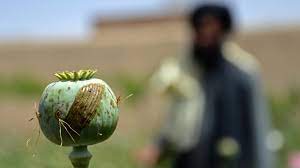Afghanistan Under Taliban Rule Has Seen a Startling 95% Decline in Poppy Growth in the Past Year
According to a UN assessment released on Sunday, Afghanistan’s opium output and poppy cultivation have decreased by 95% since the crop was outlawed by Taliban authorities. The Taliban, who retook control in 2021, have vowed to eradicate illicit drug manufacturing in the nation. In April 2022, they outlawed the growing of poppies, which are used to make heroin and opium.
According to a study issued on Sunday by the United Nations Office on Drugs and Crime (UNODC), the cultivation of poppies has decreased by an estimated 95%, from 233,000 hectares (575,755 acres) at the end of 2022 to 10,800 in 2023. The output of opium has also declined, falling from 6,200 tons in 2023 to 333 tons. The expected crop for this year is 24–38 tons of exportable heroin, down from 350–580 tons in the previous year.
“AN ACTUAL CHANCE”
According to UNODC Executive Director Ghada Waly, “this presents a real opportunity to build towards long-term results against the illicit opium market and the damage it causes both locally and globally.” Simultaneously, significant dangers and repercussions must be handled in order to achieve a final result that is favorable and long-lasting, particularly for the Afghan people.
The world’s top producer, Afghanistan, produced over a third of its entire agricultural output last year from poppies. Waly said, “Afghans need humanitarian aid now more than ever to meet their most basic needs, deal with the shock of losing their income, and save lives.” “And to give Afghan farmers alternatives to opium in the upcoming months, Afghanistan is in desperate need of significant investment in sustainable livelihoods.”
According to Roza Otunbayeva, Special Representative of the UN Secretary-General for Afghanistan and head of the UN Assistance Mission in Afghanistan, “nearly 80% of the population depends on agriculture, and Afghanistan already faces acute water scarcity challenges.” “Efforts to promote sustainable alternative development must focus on resource conservation and management, as well as drought-resistant agricultural practices.”
“IMPLICATIONS ON HUMANITY”
The abrupt collapse of Afghanistan’s opium industry has forced producers to switch to considerably less profitable alternative crops, raising concerns about possible “humanitarian consequences for many vulnerable rural communities,” according to the UN drug agency. According to the UNODC, farmer revenues, which were predicted to reach USD 1.36 billion in 2022, have dropped by 92% to USD 110 million this year. This decline is anticipated to have an effect on the already fragile national economy.
The drugs division of the Afghan interior ministry said that it “to a certain extent” concurs with the UNODC report’s estimations of the area used for poppy production. However, since they were not based on field-based surveys but rather on satellite photos and data from prior years, it disregarded other parts of the study, such as those on opium production and socioeconomic statistics.
According to the UN research, less heroin might result in decreased trafficking and use outside of Afghanistan, or it could encourage the growth of dangerous substitutes like fentanyl and other synthetic opioids. Seizures show that although heroin manufacturing has declined, dealers are clearing out their stocks of opium from previous big harvests in order to prepare for the deficit in 2023. According to the study, methamphetamine trafficking has increased in the area.







